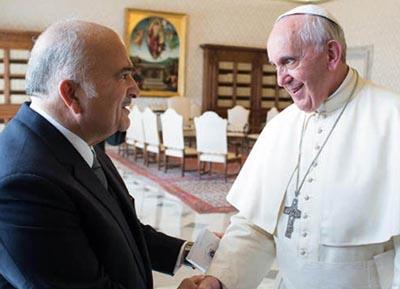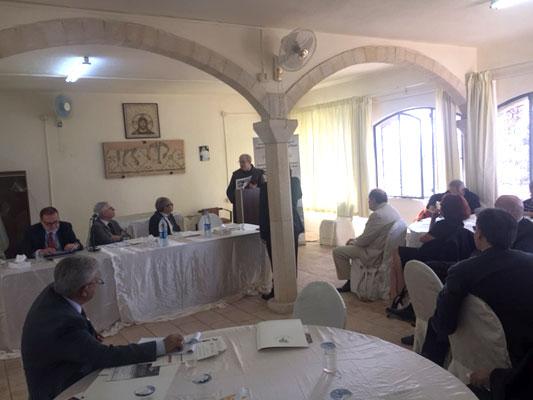You are here
With a vision of 'intra-existence', institute focuses on interfaith harmony in Jordan, region
By Rula Samain - Aug 07,2016 - Last updated at Aug 07,2016

HRH Prince Hassan meets with Pope Francis in the Vatican earlier this year. The Royal Institute for Inter-Faith Studies is working to achieve Prince Hassan’s vision of interfaith harmony (Photo courtesy of RIIFS)
AMMAN — Established in 1994, the Royal Institute for Inter-Faith Studies (RIIFS) has been working for decades to achieve HRH Prince Hassan’s vision of religious pluralism and interfaith harmony, according to its director.
RIIFS Director Majeda Omar said Prince Hassan first initiated dialogue between adherents of different faiths in the 1970s.
“Imagine how the world would have been if the call for dialogue was as active forty years ago,” she said, adding that the prince’s vision extended beyond Jordan to include the whole region.
Omar, who holds a PhD in philosophy from the University of Edinburgh, is the first female director of the institute.
At the RIIFS, she is building on the efforts of her predecessors to keep the institute and its message “alive and strong”, she told The Jordan Times in a recent interview.
Established under the patronage of Prince Hassan, the RIIFS provides a venue for the interdisciplinary study and rational discussion of religion and religious issues, with particular reference to Christianity in Arab and Islamic society, according to its website.
More recently, the RIIFS has broadened its focus to include all issues pertaining to religious and cultural diversity, regionally and globally.
“From the start, the RIIFS aimed at highlighting the Arab Christian presence in Jordan and the Arab world. It drew attention to Christians' various issues and concerns,” Omar said.
She stressed the importance of “intra-existence”, which she said was a term that Prince Hassan prefers to “coexistence”.
The institute produces publications that study and document issues related to Christianity and Muslim-Christian relations, the director added.
Among these are Al Nashra, a forum for interfaith issues, and Muqabasat Hadariya, a journal featuring articles and essays focusing on issues related to religions, cultures and civilisations.
In 2013, the institute issued the first of a multivolume who's who chronicling the biographies of Arab Christians in Islamic times.
“A great effort was exerted to issue the dictionary titled ‘Mujam Alam Al Masihiyyin Al Arab fil Usur Al Islamiyya’ [A who's who of Arab Christian notables in Islamic times],” Omar said
RIIFS started work on the publication in 1996 and is now preparing the third volume, she noted, adding that the volumes would be translated into English.
As well as its publishing efforts, the RIIFS also hosts scholars from around the world and works with local and international institutions to address critical issues.
The institute has become a reference point for those studying ways to combat terrorism and extremist ideology worldwide, according to Omar.
“The RIIFS is approached by international organisations for consultations on different topics relating to combating extremism,” she said.
In its efforts to combat terrorism, the institute has carried out youth training courses, focusing on global and human values.
It has also promoted the Amman Message, through conferences, training programmes and publications, targeting religious Islamic figures, young people, academics and the media, Omar added.
Launched in 2004, the Amman Message is a declaration aimed at clarifying the true nature of Islam to the world.
“The institute is playing a significant role in addressing extremist ideologies,” she said.
Related Articles
AMMAN — The capital will host this week the fifth colloquium held by the Royal Institute for Interfaith Studies (RIIFS) and the Pontifical C
AMMAN — Male and female preachers have received training on dialogue, tolerance and religious rhetoric during a workshop organised by the Ro
MADABA — Interreligious dialogue must be followed by action and inspire working together to shape a culture of peace and harmony

















